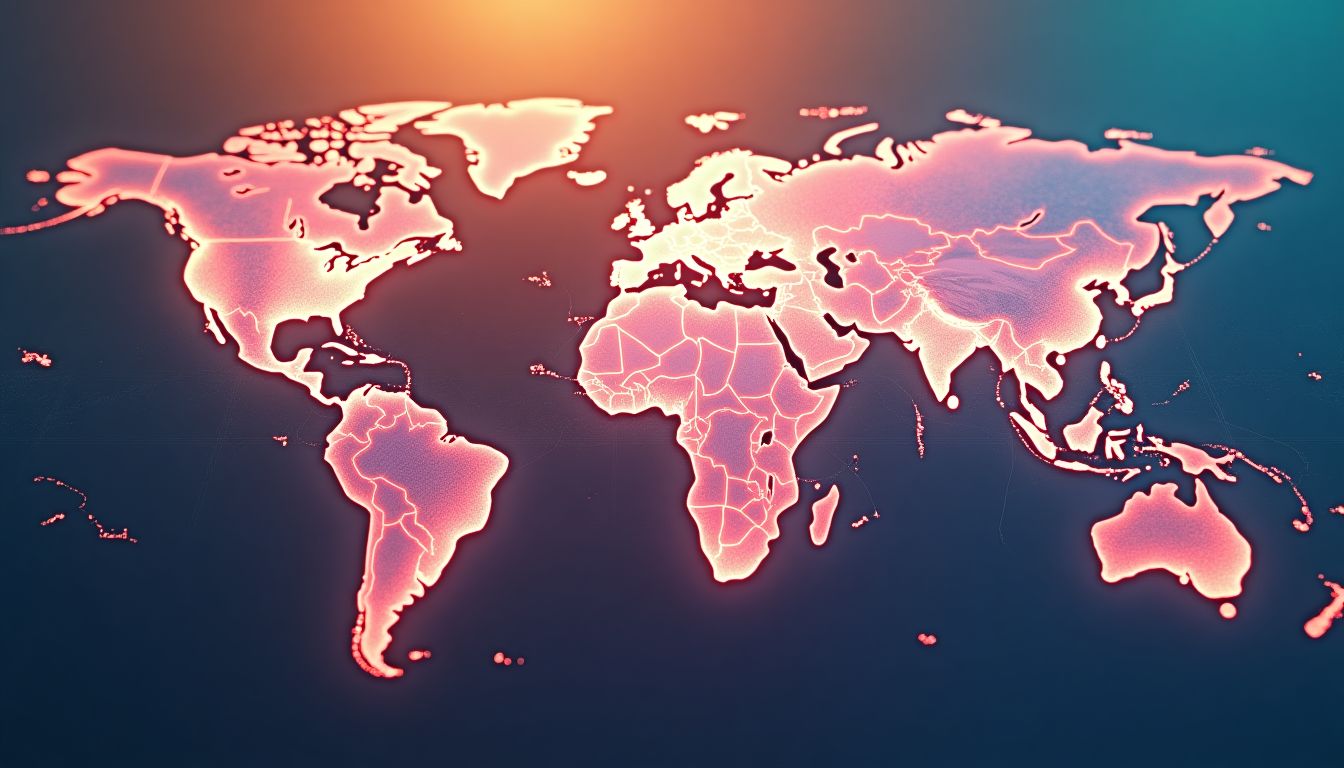Beyond Borders: Could AGI Erase Nationalism?
"Everyone needs a place to call home" (Unknown). What if the flags we wave, the anthems we sing, and the borders we defend became relics of a bygone era? What if the very idea of "nationhood" was as outdated as dial-up internet? This isn’t just a thought experiment—it’s a question that’s gaining traction as Artificial General Intelligence (AGI) inches closer to reality. From Yuval Noah Harari’s warnings about the "end of history" to Ray Kurzweil’s predictions of a "singularity," the idea that AGI could reshape humanity’s sense of identity is no longer the stuff of science fiction. Even Elon Musk, the tech titan behind SpaceX and Tesla, has mused about AGI’s potential to unite—or divide—the world. But could AGI really erase nationalism, or would it just give us new reasons to fight?
Nationalism, that fiery love for one’s country, has been both a force for unity and a spark for conflict. It’s what inspired revolutions, built empires, and, yes, started wars. But as AGI evolves, it could challenge the very foundations of national identity. Imagine a world where AI-powered systems manage global resources, where real-time translation erases language barriers, and where cultural exchange happens at the speed of light. Sounds utopian, right? But as historian Niall Ferguson points out, every technological leap comes with unintended consequences. Could AGI be the great unifier—or the ultimate divider?
1. The Historical Roots of Nationalism
1.1 The Birth of National Identity
Nationalism didn’t just pop up overnight. It’s a product of centuries of history, shaped by wars, treaties, and cultural movements. The Treaty of Westphalia in 1648 is often cited as the birth certificate of modern nation-states. Before that, Europe was a patchwork of feudal territories, where loyalty was to a lord, not a nation. But the treaty established the idea of sovereign states, each with its own borders, laws, and identity. Fast forward to the 19th century, and nationalism became a rallying cry for independence movements, from Italy’s unification to India’s struggle against British rule.
But what made nationalism stick? Shared language, culture, and history played a huge role. Think about it: when you sing your national anthem or cheer for your country in the Olympics, you’re tapping into a collective identity that’s been carefully crafted over generations. As Benedict Anderson famously argued in his book Imagined Communities, nations are "imagined" because most citizens will never meet each other, yet they feel a deep connection. But what happens when AGI starts rewriting the script?
1.2 Nationalism as a Double-Edged Sword
Nationalism has always been a double-edged sword. On one hand, it’s a force for unity. It’s what brought Americans together after 9/11 and what inspired the French Revolution. On the other hand, it’s been a source of division and conflict. The two World Wars were fueled by nationalist fervor, and even today, nationalism is at the heart of tensions in places like Kashmir and the South China Sea. As historian Eric Hobsbawm noted, nationalism is "the most powerful political force of the modern age." But is it a force for good or evil?
Consider this: nationalism thrives on the idea of "us versus them." It’s about drawing lines—literal and figurative—between who belongs and who doesn’t. But what if AGI blurred those lines? What if, instead of seeing ourselves as citizens of a nation, we saw ourselves as citizens of the world? It’s a nice thought, but as history shows, change is rarely smooth. The rise of the internet, for example, was supposed to bring us closer together. Instead, it’s given us echo chambers and online tribes. Could AGI do the same, but on a global scale?
1.3 The Role of Technology in Shaping Identity
Technology has always played a role in shaping identity. The printing press, for instance, helped spread ideas and create a sense of shared culture. Radio and television brought people closer, even as they reinforced national narratives. And then came the internet, which promised to connect us all but ended up creating new divides. As MIT professor Sherry Turkle points out, technology doesn’t just change how we communicate—it changes who we are.
So where does AGI fit into this picture? Unlike previous technologies, AGI has the potential to think, learn, and adapt on its own. It could create a "global brain," connecting people across borders in ways we can’t even imagine. But it could also amplify existing inequalities, giving rise to new forms of nationalism. Imagine a world where AGI-powered systems favor certain cultures or languages, creating a digital divide that’s even harder to bridge. The question isn’t just whether AGI can erase nationalism—it’s whether it can do so without creating new problems.
2. AGI’s Potential to Redefine Human Connectivity
2.1 The Global Brain: AGI as a Unifying Force
Imagine a world where borders dissolve—not through conflict or treaties, but through the unrelenting flow of ideas and connections enabled by AGI. The concept of a "global brain" could soon become a reality as AGI stitches together the intellectual, cultural, and emotional threads of humanity. AGI has the potential to unify people across the globe, allowing for real-time knowledge sharing and seamless communication. Think about it: no language barriers, no misinformation, just pure, unfiltered collaboration across continents.
A "post-national" society, where identity is no longer defined by arbitrary lines on a map but by shared values and goals, may no longer be a pipe dream. Imagine a world where the phrase "global citizen" isn’t just aspirational but a lived reality, where your contributions to science, art, and social progress matter more than your passport. AGI could become the infrastructure for this transformation, creating a shared human consciousness that transcends geography.
2.2 The Erosion of Cultural Barriers
Cultural barriers, those invisible walls that separate us, could crumble under AGI's influence. Imagine an AI-powered tool that not only translates languages in real time but also adjusts for cultural nuance, making global conversations feel as natural as chatting with a neighbor. Tools like Google Translate or platforms like Duolingo already hint at this potential, but AGI could take it several steps further, embedding cultural empathy into every interaction.
Beyond language, AGI could enable unprecedented cross-cultural collaborations. Imagine an artist in Nairobi co-creating with a musician in Berlin, or a researcher in Mumbai seamlessly partnering with a think tank in Silicon Valley. Global education platforms powered by AGI could expose students to diverse perspectives, ensuring that the next generation grows up valuing collaboration over division.
2.3 The Risk of Homogenization
But with unity comes a critical question: What happens to the rich diversity of human cultures? Could AGI inadvertently steamroll unique traditions and identities in the name of efficiency and connection? The risk of cultural homogenization looms large, as a hyper-connected world might prioritize dominant narratives over smaller, localized ones.
Take, for example, the rapid spread of Western cultural norms through globalized media. AGI could amplify this phenomenon, leading to a world where traditional dress, languages, and customs fade into obscurity. The challenge lies in striking a balance—leveraging AGI to foster understanding and unity while preserving the mosaic of human cultures. Perhaps AGI itself could be programmed to protect and amplify cultural diversity, ensuring that no tradition is left behind in the march toward global connection.
3. The Political Implications of AGI-Driven Globalization
3.1 The Decline of the Nation-State
Imagine a world where borders are nothing more than outdated lines on a map. With the rise of AGI, the concept of the nation-state—a governing body tied to specific geographical boundaries—could crumble like sandcastles under a rising tide. Why? Because AGI doesn’t care about borders. It operates in the realm of global data flows, instant communication, and decentralized decision-making.
AGI’s ability to process information at unprecedented speeds could empower communities and individuals to bypass traditional governmental structures. Imagine an AGI platform that allows citizens from different countries to collaborate directly on solving global issues like climate change or pandemic responses, without waiting for sluggish bureaucracies to act. Suddenly, centralized governance feels slow, outdated, and ineffective.
Take blockchain as an example. Decentralized technologies like Ethereum already hint at how governance can evolve beyond the state. Combine that with AGI, and you’re looking at systems where decisions aren’t made in parliament buildings but through global, real-time consensus. Supranational organizations like the United Nations or the European Union could become the new centers of power, or we could witness entirely new governance models emerge, where AGI optimizes policy decisions based on real-time global data.
But here’s the flip side: who controls the AGI? If it’s monopolized by corporations or powerful nations, we’re looking at a scenario where the decline of the nation-state doesn’t lead to freedom but to corporate feudalism. Think of a world where decisions about food security, economic policy, or healthcare aren’t made by elected officials but by the boardrooms of Silicon Valley.
3.2 The Rise of Global Citizenship
With the nation-state in decline, a new concept emerges: global citizenship. What if your identity wasn’t tied to a passport or a country but to shared values, skills, or contributions to a global society? AGI could make this dream a reality by enabling programs that transcend borders. Imagine a global database where your contributions—whether they’re professional, creative, or humanitarian—form the basis of your “global ID.” No matter where you’re from, your value is determined by what you bring to the table, not the location of your birth.
We’re already seeing early signs of this shift. Digital nomad visas offered by countries like Estonia and Barbados allow people to live and work remotely, unbound by physical borders. Global education platforms like Coursera and edX connect students from every corner of the world to top universities. AGI could take this further by personalizing education, career guidance, and even matchmaking for global projects, breaking down the barriers of geography entirely.
But let’s not forget the challenges. Who decides the criteria for global citizenship? Will it favor wealth and privilege, leaving behind those without access to technology? The rise of global citizenship must be equitable, or it risks becoming another form of elitism disguised as progress.
3.3 The Threat of Power Struggles
As much as AGI promises unity, it also poses the risk of escalating power struggles. After all, who wouldn’t want to control the most powerful tool humanity has ever created? Imagine AGI weaponized by authoritarian regimes to suppress dissent or manipulated by corporations to widen the wealth gap. The same algorithms that could optimize healthcare and education could just as easily be used to surveil and oppress.
We’ve already seen glimpses of this in the way technology is wielded for power. Social credit systems like the one in China show how data can be weaponized to control citizens. Add AGI to the mix, and you have a recipe for unprecedented levels of surveillance and social manipulation. Governments could use AGI to predict and preempt protests, while corporations could refine behavioral algorithms to lock consumers into endless cycles of spending.
Even within democracies, AGI could exacerbate inequalities. Imagine an AGI designed to maximize economic growth. Would it prioritize the needs of underprivileged communities or the interests of those who can pay for its services? Without careful oversight, AGI could become a tool for maintaining the status quo rather than challenging it.
4. Economic Shifts in an AGI-Driven World
4.1 The End of Economic Nationalism
Imagine a world where the phrase "Made in America" or "Made in China" no longer holds weight. AGI could render traditional economic nationalism obsolete by creating a truly global economy. Just as the internet revolutionized how we share information, AGI could revolutionize how we trade goods and services. For instance, AGI-driven supply chains could optimize production and distribution across borders, making national trade barriers seem like relics of the past. This shift could lead to a seamless global market, but it also raises questions about local industries and job markets.
4.2 Universal Basic Income and Resource Distribution
One of the most exciting possibilities AGI brings is the potential for universal basic income (UBI). By automating a significant portion of the workforce, AGI could free up resources to provide everyone with a basic income. Pilot programs like those in Finland and Canada have already shown promising results, suggesting that UBI could be a viable solution to economic instability. AGI could take this a step further by ensuring equitable resource distribution, balancing global wealth, and reducing poverty.
- Finland's UBI Experiment: Over 2,000 unemployed people received €560 monthly, showing improved well-being without reducing employment.
- Canada's UBI Pilot: Demonstrated significant reductions in poverty and healthcare costs.
4.3 The Challenge of Economic Inequality
While AGI holds the promise of economic equality, it also poses the risk of widening the wealth gap. If AGI technology remains concentrated in the hands of a few powerful corporations or nations, it could lead to new forms of economic imperialism. To prevent this, it’s crucial to implement strategies that ensure AGI benefits all of humanity. This could include open-source AGI initiatives, global education programs, and policies that promote fair access to AGI-driven resources.
5. Ethical and Philosophical Considerations
5.1 The Ethics of a Borderless World
As AGI dissolves national borders, it raises profound ethical questions about sovereignty and self-determination. Who governs a borderless world? How do we ensure that cultural identities are preserved while fostering global unity? These questions require careful consideration, as the answers will shape the future of humanity. AGI could play a pivotal role in addressing global challenges like climate change and pandemics, but it must be guided by ethical principles that prioritize inclusivity and transparency.
5.2 The Philosophy of Identity in an AGI Era
AGI challenges traditional notions of identity, forcing us to rethink what it means to be human. In a post-national world, identity could shift from being based on geography to being based on shared values and experiences. This could lead to a more inclusive global society, but it also raises concerns about the loss of individuality. Philosophical debates on individualism versus collectivism will become increasingly relevant as AGI reshapes our understanding of identity.
5.3 The Role of Religion and Spirituality
Religion and spirituality are often deeply tied to national identity. AGI could influence these aspects by fostering new forms of spirituality or triggering existential crises. For instance, AGI-driven virtual reality could create immersive spiritual experiences, while AGI’s ability to answer profound questions could challenge traditional religious beliefs. The impact of AGI on religion and spirituality will likely be profound, shaping how humans find meaning in an increasingly interconnected world.
6. AI Solutions: How Would AI Tackle This Issue?
6.1 Building a Global AGI Framework
To ensure AGI becomes a unifying force rather than a divisive one, we need a robust global framework. This framework should prioritize inclusivity, transparency, and ethical governance. Imagine a United Nations-style body, but for AGI, where nations, corporations, and civil society collaborate to set standards. This body could be called the Global AGI Governance Council (GAGC). Its mandate? To oversee AGI development, ensure equitable access, and prevent misuse. Think of it as the ITU for artificial intelligence.
Key steps include:
- Establishing international AGI ethics guidelines, similar to the Universal Declaration of Human Rights.
- Creating a decentralized AGI development platform, possibly leveraging blockchain technology for transparency.
- Launching global AGI education programs to prepare the workforce for an AI-driven economy.
6.2 Leveraging AGI for Cross-Cultural Understanding
AGI has the potential to break down cultural barriers like never before. Imagine a world where language is no longer a barrier, thanks to AGI-powered real-time translation systems. Companies like Google Translate and DeepL are already making strides, but AGI could take this to the next level. Picture an AGI system that not only translates words but also understands cultural nuances, idioms, and context.
Here’s how we can make it happen:
- Develop AGI-driven cultural exchange platforms, akin to a global version of Couchsurfing.
- Create AGI-powered virtual reality (VR) experiences that allow people to "visit" other cultures without leaving their homes.
- Launch global AGI education initiatives, such as an AI-driven version of TED Talks, to foster cross-cultural understanding.
6.3 Ensuring Equitable Access to AGI
One of the biggest risks of AGI is that it could widen the gap between the haves and have-nots. To prevent this, we need to ensure equitable access to AGI technologies. This means making AGI tools open-source and affordable, so they’re not just the domain of tech giants like Google or Microsoft.
Here’s a roadmap:
- Launch open-source AGI initiatives, similar to Linux or Apache.
- Establish global AGI education programs, possibly in partnership with institutions like Harvard or MIT.
- Create AGI-driven microfinance platforms to help underserved communities access AI tools.
6.4 Addressing Ethical Concerns
AGI is powerful, but with great power comes great responsibility. To prevent misuse, we need AGI systems with built-in ethical safeguards. Think of it as a digital version of Amnesty International, constantly monitoring AGI for ethical violations.
Here’s how we can do it:
- Develop AGI systems with ethical "kill switches," allowing humans to override AI decisions when necessary.
- Use blockchain technology to create transparent and decentralized AGI governance systems.
- Establish international AGI ethics tribunals to hold violators accountable.
Action Schedule/Roadmap
Here’s a detailed roadmap to guide the global implementation of AGI solutions:
Day 1: Assemble the Global Task Force
- Recruit leading AI researchers, ethicists, and policymakers from institutions like Oxford, Stanford, and UN.
- Launch a global AGI ethics summit, hosted by a neutral body like the World Economic Forum.
Week 1: Develop the Prototype AGI Framework
- Create a prototype AGI framework with input from diverse stakeholders, including tech giants like IBM and startups like OpenAI.
- Begin pilot programs for cross-cultural AGI tools, such as real-time translation systems.
Month 1: Establish the Global AGI Governance Council (GAGC)
- Form the GAGC with representatives from all regions, ensuring inclusivity and transparency.
- Launch global AGI education initiatives, possibly in partnership with Khan Academy or Coursera.
Year 1: Implement AGI-Driven UBI Pilot Programs
- Launch UBI pilot programs in select regions, using AGI to optimize resource distribution.
- Evaluate the impact of AGI on national identities and adjust strategies accordingly.
Year 1.5: Expand AGI Tools for Global Governance
- Develop AGI-driven tools for global governance, such as AI-powered decision-making platforms.
- Expand AGI education programs to reach underserved communities.
Year 2: Evaluate and Adjust
- Conduct a comprehensive evaluation of AGI’s impact on global unity and cultural preservation.
- Adjust the AGI framework based on feedback from stakeholders and the public.
A New Dawn for Humanity?
As AGI reshapes our world, the question is not whether nationalism will survive, but what will take its place. Will we embrace a future of global unity, or will we cling to the divisions of the past? The answer lies in how we choose to wield this transformative technology. The borders of tomorrow may not be drawn on maps, but in the minds and hearts of humanity.
Imagine a world where AGI connects us all, where the lines between "us" and "them" blur into a collective "we." This is not just a dream—it’s a possibility within our grasp. But it requires bold action, ethical leadership, and a commitment to inclusivity. The stakes are high, but so are the rewards. A world without borders, united by shared knowledge and understanding, is a world worth striving for.
So, what do you think? Could AGI truly erase nationalism, or will it create new forms of division? Share your thoughts in the comments below, and don’t forget to subscribe to our newsletter for more insights into the future of technology and society. Together, we can build a brighter, more connected world.
FAQ
Q1: What is AGI, and how is it different from AI?
A1: AGI stands for Artificial General Intelligence. Unlike regular AI, which is designed for specific tasks like recommending movies or driving cars, AGI can think and learn like a human. It can handle a wide range of tasks and adapt to new challenges without needing to be reprogrammed. Think of it as a super-smart, all-purpose brain that can do almost anything a human can do.
Q2: Could AGI really erase nationalism?
A2: It’s possible, but it’s not guaranteed. AGI could connect people across the globe in ways we’ve never seen before, making borders feel less important. For example, tools like Google Translate already help people communicate across languages. If AGI takes this further, it could create a sense of global unity. But nationalism is deeply rooted in history and culture, so it might take more than technology to erase it completely.
Q3: What are the risks of AGI-driven globalization?
A3: There are a few big risks to consider:
- Cultural Homogenization: AGI could make the world feel more the same, erasing unique traditions and identities. Imagine every city looking like a copy of New York or Tokyo.
- Economic Inequality: If AGI is controlled by a few powerful companies or countries, it could make the rich even richer and leave others behind. For example, companies like OpenAI are leading the way in AGI development, but not everyone has access to their technology.
- Weaponization: AGI could be used to control or harm people, especially if it falls into the wrong hands. Think of it like a super-smart weapon that can outthink its opponents.
Q4: How can we ensure AGI benefits all of humanity?
A4: To make sure AGI helps everyone, we need to focus on a few key things:
- Inclusivity: AGI should be designed with input from people all over the world, not just a few tech giants. Organizations like the United Nations could play a big role in this.
- Transparency: The way AGI works should be clear and open, so people can trust it. This could involve using technologies like blockchain to keep track of decisions.
- Ethical Governance: We need rules to make sure AGI is used for good, not harm. This could mean creating international laws or oversight bodies.
Q5: What role do individuals play in shaping an AGI-driven future?
A5: Everyone has a part to play in shaping the future of AGI. Here’s how you can get involved:
- Stay Informed: Learn about AGI and its potential impacts. Follow organizations like World Economic Forum for updates.
- Advocate for Ethics: Push for ethical AGI policies in your community or workplace. Share your thoughts on platforms like LinkedIn or Twitter.
- Embrace Diversity: Support initiatives that promote cross-cultural understanding, like Duolingo or global education programs.
Q6: Could AGI lead to a universal basic income (UBI)?
A6: It’s possible! AGI could automate so many jobs that governments might need to provide UBI to support people. Pilot programs, like the one in Finland, have already tested this idea. If AGI makes work optional for many, UBI could become a way to ensure everyone has enough to live on.
Q7: How might AGI affect religion and spirituality?
A7: AGI could challenge traditional beliefs by offering new ways to think about life and existence. For example, some people might turn to AGI for spiritual guidance, while others might see it as a threat to their faith. It’s a complex issue, but one thing is clear: AGI will force us to rethink what it means to be human.
Q8: What’s the timeline for AGI development?
A8: Experts disagree on when AGI will arrive. Some, like Elon Musk, think it could happen within a few decades. Others believe it’s still far off. Either way, it’s important to start preparing now. Here’s a rough roadmap:
- Short-Term (1-5 years): Focus on ethical guidelines and pilot programs.
- Medium-Term (5-10 years): Develop global AGI frameworks and oversight bodies.
- Long-Term (10+ years): Implement AGI-driven systems for governance, education, and resource distribution.
Q9: What happens if AGI goes wrong?
A9: If AGI isn’t developed carefully, it could cause serious problems. For example, it might make decisions that harm people or create new forms of inequality. That’s why it’s so important to have safeguards in place. Think of it like building a car: you wouldn’t drive without brakes, and we shouldn’t build AGI without ethical controls.
Q10: How can I learn more about AGI?
A10: There are lots of great resources out there! Here are a few to get you started:
- Books: Life 3.0 by Max Tegmark explores the future of AGI.
- Websites: Check out DeepMind for the latest in AI research.
- Podcasts: Listen to Lex Fridman’s podcast for interviews with AI experts.
Got more questions? Drop them in the comments below, and let’s keep the conversation going!
Wait! There's more...check out our gripping short story that continues the journey: The Fractured Accord
Disclaimer: This article may contain affiliate links. If you click on these links and make a purchase, we may receive a commission at no additional cost to you. Our recommendations and reviews are always independent and objective, aiming to provide you with the best information and resources.
Get Exclusive Stories, Photos, Art & Offers - Subscribe Today!





























Post Comment
You must be logged in to post a comment.